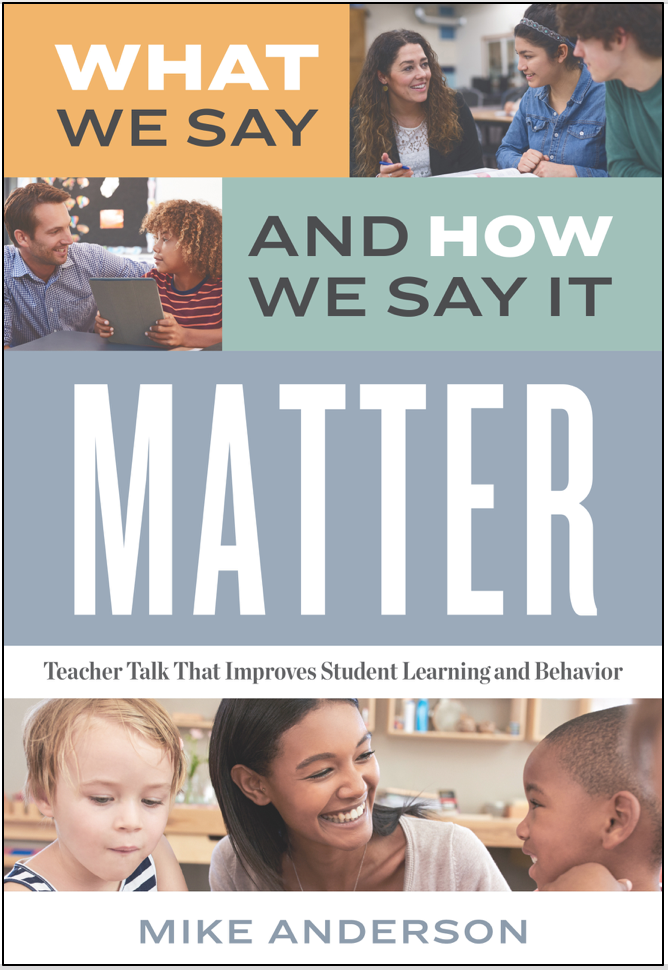How (and Why) I Stopped Saying, “I like the way you…”

For a long time, when I wanted to give students positive feedback about their work or behavior, I began with some version of, “I like the way you…”
- “Jeremy, I like the way you’re working so hard on that math challenge!”
- “Hey, everyone! I loved the way you just walked down the hall so quietly!”
- “Lisa, I appreciate how much energy you have for this science project!”
- “Markus, thank you so much for pushing in your chair after lunch!”
In addition to using this kind of language to provide positive feedback, I also used it to manipulate other students.
- While looking at Richard with eyebrows raised and eyes wide, I might compliment Laura, “Laura I love the way you’re sitting still and ready to listen.”
- “Rico’s group…I like the way you’re picking up your writing supplies and putting them away so quickly!” (I would be looking around the room at all of the other groups who were not cleaning up.)
Then, in 1995, I took a summer workshop with Paula Denton (one my most important and influential professional mentors), who later authored The Power of Our Words. Through this workshop, I realized that my language, something I had never really thought about that deeply, needed some work.
A Beliefs and Goals Mismatch
My language needed work because it didn’t match my beliefs about (and goals for) children, teaching, and learning. While I believed that all children were already intrinsically motivated to work hard and do the right thing, my language sometimes reflected the reverse. “I love the way you are working so hard, Melissa!” was meant to inspire and motivate her to keep up her good work—as if she wasn’t already motivated to do so. While I wanted my students to be independent and self-confident, my language sometimes reinforced their dependence on me and my approval: “I like the way this class is being so respectful as we get ready for our guest speaker!” (The message here is that gaining my approval is the primary reason for doing the right thing.) Once I started paying attention to the way I gave students positive feedback, I realized that although I said I believed in a student-centered classroom, my language was awfully teacher-centric. My language was out of sync with my beliefs and goals, and I desperately wanted to change.
Strategies
There were three things I did to work at shifting my language.
Replacement Language: First, I had to figure out what I would say when I wanted to reinforce positive behavior and good work. How could I still guide and support students without manipulating or hooking them into being teacher-pleasers? I wrote a list of phrases that would help me know what to say instead. I focused on language that emphasized observation over judgment and focused more on students than myself.
- “It looks like you have been working really hard on this.”
- “You must be proud of yourself! Congratulations!”
- “Tell me more about how you came up with this idea in your writing.”
- “I notice that as a class, we walked respectfully in the hallway. That helped other classes stay focused!”
I posted sentence starters (like the ones underlined above) high on the walls around the perimeter of my classroom, written in dark marker on sheets of oak tag so I could see them easily. This helped me remember the new language examples while in the midst of the craziness of the classroom.
Student Help: Of course, my students wanted to know what the posters were all about, so I decided to enlist their help. “This year, I’m working on shifting my teacher language,” I explained. “I’m working at not starting off positive feedback with saying, ‘I like.’ Could you all give me a hand with that? If you hear me saying “I like,” would you give me a gentle reminder?” My fourth graders were more than willing to help me out! Interestingly, I noticed language shifts with my students as well. Their language mirrored my language, and became more supportive and authentic as they worked together.
 Practice: Even as a young teacher, I had deeply ingrained language habits. Though I was only entering my third year as a classroom teacher back in 1995, I had been working with kids in organized settings (teaching swimming lessons, babysitting, coaching swim teams, working in a preschool, and working as a camp counselor) for almost a decade. It was going to be hard to change, so I gave myself permission to make mistakes. I also practiced—a lot. I practiced in the car while driving to and from school. I practiced every day in the classroom. I even practiced at home with my cat. (“Peter, I notice you brought a bird to the back door! You must be so proud of yourself!”) A little goofy perhaps, but it helped.
Practice: Even as a young teacher, I had deeply ingrained language habits. Though I was only entering my third year as a classroom teacher back in 1995, I had been working with kids in organized settings (teaching swimming lessons, babysitting, coaching swim teams, working in a preschool, and working as a camp counselor) for almost a decade. It was going to be hard to change, so I gave myself permission to make mistakes. I also practiced—a lot. I practiced in the car while driving to and from school. I practiced every day in the classroom. I even practiced at home with my cat. (“Peter, I notice you brought a bird to the back door! You must be so proud of yourself!”) A little goofy perhaps, but it helped.
Eventually, I didn’t have to work quite so hard. Language that more closely matched my positive beliefs in children and my goals for students became habits and happened more automatically.
If you’re interested in exploring this topic in more detail, you might want to explore many resources I have placed in a LiveBinder. You might also want to check out my newest book, which is all about how to align our teacher talk with our best intentions: What We Say and How We Say It Matter. You might also want to check out a new resource–designed for busy teachers. It’s a quick reference guide: Teacher Talk that Matters. It’s packed with helpful tips!
If we want students to become more independent and reflective--to have more ownership of their learning and behavior, we need to stop emphasizing our approval as the main motivation in the classroom. #teacherlanguage
Mike Anderson Tweet
Author
-
Mike Anderson has been an educator for many years. A public school teacher for 15 years, he has also taught preschool, coached swim teams, and taught university graduate level classes. He now works as a consultant providing professional learning for teachers throughout the US and beyond. In 2004, Mike was awarded a national Milken Educator Award, and in 2005 he was a finalist for NH Teacher of the Year. In 2020, he was awarded the Outstanding Educational Leader Award by NHASCD for his work as a consultant. A best-selling author, Mike has written ten books about great teaching and learning. His latest book is Rekindle Your Professional Fire: Powerful Habits for Becoming a More Well-Balanced Teacher. When not working, Mike can be found hanging with his family, tending his perennial gardens, and searching for new running routes around his home in Durham, NH.
You may also like

5 Reasons to Not Use Incentives This Year (and 5 Things to Do Instead)
- July 31, 2024
- by Mike Anderson
- in Blog

Feeling Burned Out? Maybe It’s Time for a Shake-Up!

How Teachers Can Forge Instructional Autonomy
Leave a ReplyCancel reply
This site uses Akismet to reduce spam. Learn how your comment data is processed.


Comments
Not sure using “you must” is any better than “I Like” isn’t that telling a child how they should feel? Maybe something like “you’ve worked really hard are you proud of your hard work?” Or “wondering if you’re feeling proud or a sense of pride with all the hard work?”
Sure thing, Susan. Asking or wondering how students are feeling instead of assuming we know can help place even more ownership back on students!
My favorite is “Tell me more…………” I;ve often had to help students develop their writing by having them to tell me more.